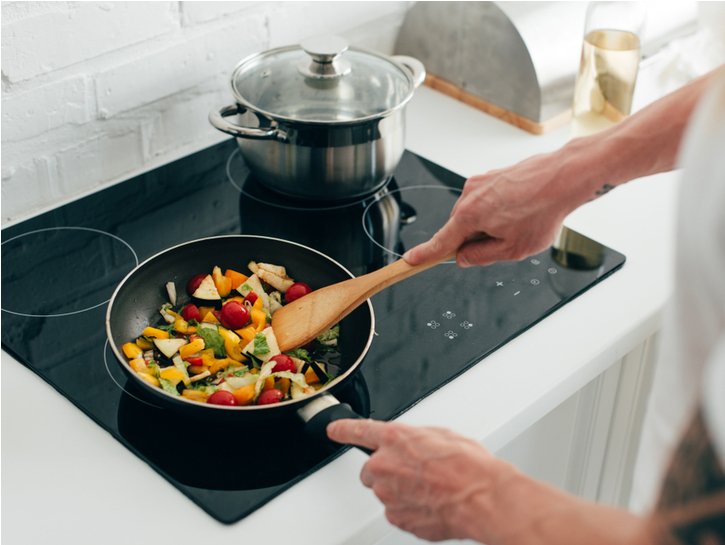One of the hottest debates in the culinary community is what type of stove is the best to cook with — electric or gas. What makes such a difference between the two, and do the differences even matter?
What Is A Gas Stove?

Vereshchagin Dmitry/Shutterstock
A gas stove uses natural gas, propane, butane or another form of flammable gas to create a fire for cooking. It requires either natural gas or propane lines to run from outside the home into the kitchen. Natural gas comes directly from the company supplying it through underground gas mains, while propane gas comes from large tanks installed outside the home.
The ignition for a gas stove is either a pilot light or an electric start. The pilot light is a tiny flame that is always on, which sits under the lid of the cooktop and the broiler. When the burner is turned on, the pilot light is ignited, and a larger flame appears. With an electric start, when the burner is turned on, an electric spark ignites the flame. Regardless of ignition type, the stove top on a gas stove does not need an outside source to light. If there is no electric spark, a lighted match will do the trick.
What Is An Electric Stove?

NavinTar/Shutterstock
An electric stove uses electricity to heat up coils for cooking. It requires a dedicated circuit and cannot be plugged into just any outlet. An electric stove does not require an ignition switch to turn on and heat the stove like a gas stove does. Simply turn the knob on the stove or oven to turn on the burner. And electric stove has either raised coils, like the grates of a gas stove top, or a glass-ceramic flat top range where the coils are beneath the surface. The oven has large coils above and below the cooking racks.
Consider The Cost
Gas stoves and electric stoves tend to run the same in cost as far as the appliance is concerned. Each type has different models that range from cheaper to more expensive options, depending on each model’s features. Both gas and electric stoves average $500 to $800, with each type offering more costly models ranging from $1,500 to $10,000.
However, the cost of operating a gas or electric stove differs. Though utilities vary from state to state, natural gas and propane costs are typically cheaper than electricity. A gas stove typically produces better performance per dollar for energy used than an electric stove does.
Range Performance
Professional chefs argue the gas stove is the top performer over an electric stove because it heats up faster and allows chefs to maintain greater control when cooking. With the instant flame of a gas stove, the stove can reach the desired temperature quicker and more precisely. Gas stoves also give chefs the ability to go from high heat to low heat quickly and maintain a constant low temperature.
Oven Performance

Inked Pixel/Shutterstock
When it comes to baking or roasting in the oven, the jury is split. Most agree that the even cooking of the oven is comparable in both types. A gas oven will give off more moisture than an electric stove, which can be both good and bad depending on the food in the oven. A roast can use the extra moisture to keep the meat tender, while the excess moisture is not necessarily wanted for, say, cookies.
Cleanliness Factor
With splattering oil, accidental sloshes out of a pot or grease dripping onto the bottom of the oven, cooking can be messy. A clean stove is essential to producing tasty meals. Typically, cleaning an electric stove is easier than cleaning a gas stove. Because the majority of electric ranges are now flat glass-ceramic tops, cleaning is as easy as wiping it down with a special cleaner. In order to clean a gas stove, the burner grates have to be removed and scrubbed. However, if the electric stove top has the raised coils, cleaning can be tricky because the coils can be tough to remove.
Extra Features
Electric stoves are more likely to come with extra features, such as a range top digital timer, preheat option and clock. They may also come with heat settings for specific foods, such as pizza, much like a microwave does. Some electric ovens offer convection fans as well, which circulate the heat inside the oven. Additional features include a timer that turns the oven off and on at specifically designated times, a storage drawer and warming function. Gas stoves don’t have many of these features that electric stoves can offer.

napocska/Shutterstock
Safety Concerns
Any stove can be dangerous, and extra caution is advised when using one. Gas stoves have an open flame, which brings its own risk of fire and burning. There is also the possibility of a gas leak with gas stoves.
Electric stoves take time to cool down, so the stove top might still be too hot to touch long after cooking is done and it may be deceiving because it is not always apparent that the coils are still too hot.
Which Stove Is Best?
Ultimately, that’s up to you to decide. Depending on your desired features and your own personal cooking preferences, a gas stove or an electric stove can be a better fit for your kitchen. Just be sure to put some thought into what you want out of a stove before purchasing and installing one.
